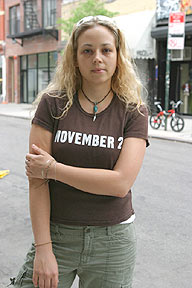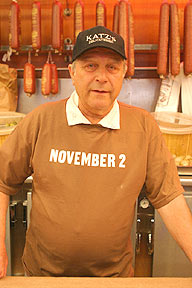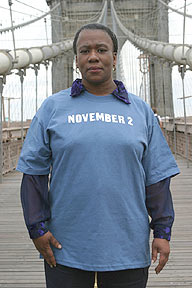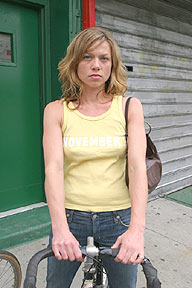New York City Election 2004
|
This feature has moved to a new location. If you are not automatically directed to the correct page, click the following link: |
New York City Election Day: Guide for the Last Minute Voter
|
Related: |
Chinatown resident Peter Chen is excited about going to the polls for the first time on Tuesday, November 2 and hopes his vote will make a difference.
"I am concerned about the economy and standard of living in Chinatown," said Chen. "And the war in Iraq is a major issue for me."
Chen is one of 338,000 recently registered voters in New York City (and an estimated 10 million new voters nationwide) who could help decide what has been called the most important election in a generation.
But when asked about other races in New York on Election Day - for U.S. Senate, Congress, State Legislature, and judicial seats - Chen admitted he did not know who was on the ballot.
"I only know about the race for president," he said.
For New Yorkers looking for information beyond the presidential race, Gotham Gazette offers the following guide for the last minute voter.
After the election is over, visit Gotham Gazette for the results of all of the races, from president to civil court judge.
- WHO IS RUNNING? WHAT DO THEY STAND FOR?
- WHERE DO I VOTE?
- WHAT DO FIRST TIME VOTERS NEED TO KNOW?
- WHAT ARE MY VOTING RIGHTS?
- WHAT IF I ENCOUNTER PROBLEMS AT THE POLLS?
- HOW DO I FIND RESULTS?
- WHAT COULD GO WRONG WITH THE ELECTION?
WHO IS RUNNING? WHAT DO THEY STAND FOR?
|
|
President
While most of the presidential campaign has focused on the war in Iraq and terrorism, and the candidates have spent most of their time in "swing states," the next president will shape the future of the city in key ways.
For ten ways the next president could help - or hurt - New York City, see an issue-by-issue breakdown of the positions and promises of George W. Bush and John Kerry.
For a list of all of the candidates who will appear on the New York City ballot and their Web sites, see Gotham Gazette's presidential page.
U.S. Senate
New York Democratic Senator Charles Schumer faces six challengers on Election Day. (Senator Hillary Clinton does not have to run again until 2006.)
In a recent debate, Schumer and two challengers - Republican Howard Mills and Conservative Marilyn O'Grady - offered differing views on local issues like taxes, funding for homeland security, and whether a Jets stadium should be built on the west side of Manhattan.
And although he was not allowed to be part of the debate, Green Party candidate David McReynolds outlines his platform, which includes ending the war in Iraq, legalizing gay marriage, and relying on more sustainable sources of energy in a Gotham Gazette article.
For more on each of the candidates, their views, and an archive of news stories about the race see Gotham Gazette's coverage of the Senate race.
U.S. House
Twelve of the thirteen New York representatives to the U.S. Congress face challengers in the General Election (Rep. Gregory Meeks is running unopposed in southeastern Queens).
Gotham Gazette asked each incumbent and many challengers to write articles about their ideas on critical issues like housing, transportation, health care, and the environment. (To read the articles, visit Focus on the Feds.)
To find out who is running in your district, type your address into Gotham Gazette's Congressional District finder.
See a full list of candidates for Congress in New York City.
State Legislature
All 89 New York City representatives to the New York State Legislature are up for re-election this fall. And most New Yorkers who have read a newspaper in recent months know at least one thing about the government in Albany - it's a mess.
|
|
Lawmakers in Albany missed the budget deadline for the 20th year in a row. They failed to come up with funding for city schools even though the courts ordered them to do so. And several members have been indicted in scandals and criminal activity. Last month, former Senator Guy Velella, who was serving a one-year sentence for bribery, was released from jail by an obscure commission after serving only three months. (Read more about Albany's Dysfunction)
However, despite calls for reform and new leadership, most of the incumbents will be heading back to Albany after Election Day; a quarter of the city's incumbents face no opposition.
Still there are some races to watch.
In the Bronx, Democrat Jeff Klein, Republican John Fleming and Independence/Conservative Stephen Kauffman are battling to fill a vacant seat left open after Velella left office. (See an article on this race.)
In Brooklyn and the north shore of Staten Island, Democrat Diane Savino and Republican Al Curtis face off for an open seat created by the retirement of Senator Seymour Lachman. (Read an article on this race).
In East Harlem, Democrat Jose Serrano is challenging long-time Senator Olga Mendez, who switched to the Republican Party in 2002. (Read an article about this race.)
And in Flushing, Queens, Democrat Jimmy Meng, after defeating incumbent Assemblymember Barry Grodenchik in the primary, will face Republican Meilin Tan and Green Party candidate Evergreen Chou in a race that will likely produce the first Asian American member of the State Legislature. (Learn more about this race.)
For more state races to watch, see Gotham Gazette's Eye On Albany 2004.
Click here for a full list of all of the state primary races and candidates.
Judicial Races
On Election Day, New Yorkers will also elect judges to serve in local courts.
Each borough will choose Supreme Court judges who oversee criminal cases, divorces, and civil cases where the value of the dispute - whether it is commercial, personal injury, real estate, or a civil rights case - is more than $25,000;
- The Bronx will choose three justices
- Brooklyn and Staten Island will choose five justices
- Manhattan will choose five justices
- Queens will choose six justices.
Some voters will also select Civil Court judges who hear private, non-criminal lawsuits, which have a monetary value of less than $25,000. (Read an article explaining the New York court system.)
New York's courts have also been plagued by scandals and by corruption in the way judges are elected. To learn more, play Gotham Gazette's interactive Judges Game.
Click here for a full list of judicial candidates.
WHERE DO I VOTE?
|
|
Voters who have registered should have received a yellow postcard in the mail with the address of their polling place. If you did not, call the Board of Elections at 1-866-VOTE NYC. You can also e-mail them at This email address is being protected from spambots. You need JavaScript enabled to view it. with your complete address, and you should receive an email back instructing you where to vote. You can also look it up online at www.mypollingplace.com.
Polls open at 6:00 a.m. and close at 9:00 p.m.
Those who wish to file absentee ballots have two delivery options.
WHAT DO FIRST TIME VOTERS NEED TO KNOW?
New voting regulations may cause confusion at the polls this year.
New Yorkers who registered to vote for the first time via mail after January 1, 2003, will be asked to provide identification, such as a driver's license, when they go to the polls.
Those without a driver's license can also offer a copy of one of the following:
- a valid photo ID
- a current utility bill
- a bank statement
- a government check or other government document that shows the voter's name and address.
Those who don't have any form of identification or refuse to supply one will be allowed to vote on paper ballot, not in the machines, according to the Board of Elections. Those votes will be counted if they are verified to match registration forms. (Read more about I.D. requirements.)
The new rule is part of the federal Help America Vote Act, which Congress passed after the turmoil in Florida during the 2000 presidential election. (Read more about efforts to reform voting in New York.)
WHAT ARE MY VOTING RIGHTS?
The New York Voter's Bill of Rights guarantees the right to:
"Vote: The right to vote includes voting for candidates and questions on the ballot.
Have Your Vote Count: Vote on a voting system that is in working condition and that will allow votes to be accurately counted.
Secrecy in Voting: Secrecy in voting will be preserved for all elections.
Freedom in Voting: Cast your vote, free from coercion or intimidation by poll workers or any other person.
Permanent Registration: Once registered to vote, you will continue to remain qualified to vote from an address within your county or city.
Accessible Elections: Non-discriminatory equal access to the election system for all voters, including the elderly, disabled, alternative language minorities, military and overseas citizens, as required by federal and state laws.
Assistance in Voting: You may ask for help in voting because of blindness, disability, or inability to read or write.
Instructions in Voting: You can view a sample ballot in this polling place prior to voting, and before entering the machine, you may request help in how to operate the machine.
Absentee Voting: If you will be out of your county of residence on Election Day, or are unable to go to your polling place due to illness or physical disability, you may cast an absentee ballot.
Affidavit Voting: Whenever your name does not appear in the official poll book, you will be offered an affidavit ballot."
WHAT IF I ENCOUNTER PROBLEMS AT THE POLLS?
|
|
If a poll worker says you are not on the list, ask an inspector to verify that you are at the correct Election and Assembly District for your address. If you believe that you are eligible to vote, you can ask for a paper ballot. After the election, the Board of Elections will check its records and your vote will be counted if you are deemed eligible to vote and were at the correct polling site.
The Board of Elections says that it has increased efforts to make polling places accessible for senior citizens and handicapped voters, but they admit that there are still problems at some sites. Voters who feel that their polling site is inaccessible should call the Voter Registration Unit of their local borough office for information.
For answers to basic questions like "What If I Need Assistance In The Voting Booth?" and "Can I Take Time Off Work To Vote?" see the New York Civil Liberties Union voting guide.
If you encounter problems at the polls, call one of the following places:
- U.S. Department of Justice: 800-253-3931
- ACLU Voting Rights Project: 877-523-2792
- NAACP Legal Defense Fund: 800-221-7822
- New York Civil Liberties Union: 212-344-3005
- New York Public Interest Research Group/Common Cause: 212-822-0282
For assistance in Chinese, Korean, Tagalog, Hindi, Khmer and English, call the Asian American Legal Defense Fund at 800-966-5946.
For assistance in Spanish or English, call the Puerto Rican Legal Defense and Education Fund at 1-866-OUR-VOTE.
HOW DO I FIND OUT THE RESULTS?
On Election Day, most media outlets will focus on the presidential race. For results of all the local races as they become available on election night and the days following, visit Gotham Gazette's results page.
WHAT COULD GO WRONG WITH THE ELECTION?
Many experts are predicting that the presidential election may not be decided on Election Day.
In 2000, the Supreme Court did not rule on the lawsuit of Bush v. Gore until December 12. (Read New York Times articles from attorneys for Al Gore and George W. Bush on their predictions of what will happen in this year's vote count.)
For weeks leading up to the election, there have been dozens of daily stories of faulty voting machines, legal challenges to voting rolls, a shortage of poll workers, misplaced absentee ballots, and accusations from both political parties that the other side is trying to disenfranchise voters or commit voter fraud.
To track news on the voting process in New York and in other states, see Gotham Gazette's Election Watch.
And while you are waiting for election results, learn about some of the problems in the New York's voting system by playing interactive games at Gotham Gazette's Voting Arcade.
Â
New York City Council STATED MEETING - October 27, 2004
New York City Council Stated Meeting Report
Every two weeks the New York City Council meets for its Stated Meeting to introduce and pass legislation. As a regular feature, Searchlight covers these meetings and posts a summary of the bills passed.
STATED MEETING - October 27, 2004
Quote of the Day:
"This afternoon will live in good government infamy.... I will not participate in a campaign finance system changed in an election year. I say this as someone who has always been a participant. I will pass up all the matching funds that I would be entitled to and I won't touch a single, dirty dollar." - Brooklyn Councilmember Simcha Felder voting against changes in the city's campaign finance program.
Meeting Summary:
The City Council passed a package of bills that it promises will strengthen and improve the city's campaign finance program.
The measures (Intros 124-A, 371-A, and 466-A) increase the maximum amount of public matching funds to $6 for every $1 a candidate raises. The six-to-one matching funds apply to donations under $250 in mayoral races where candidates spend more than $17 million or in City Council races where a candidate spends more than $450,000.
Under the current law, candidates who agree to spending limits are eligible for $4 to $1 matching funds; in mayoral races where a candidate spends more than $2.8 million, candidates are eligible for $5 to $1.
The legislation would also require self-financed candidates who choose not to be part of the voluntary public financing system to abide by the same limits on contributions and spending as those who join the program. Candidates who are not part of the program would also have to comply with disclosure requirements.
The legislation will aid opponents of billionaire Mayor Michael Bloomberg, who spent $74 million of his own money in 2001 and has said he is willing to spend more to get reelected in 2005. City Council Speaker Gifford Miller, who said that the bills would help "ensure free and fair elections," is considered a possible candidate in next year's mayoral race.
The council approved the legislation by a vote of 42 to 7.
Four Democrats - Simcha Felder, Tony Avella, Allan Jennings, and Madeline Provenzano - and three Republicans - James Oddo, Dennis Gallagher, and Andrew Lanza - voted against increasing the amount of matching funds.
"The six to one match is obscene," said Councilmember Madeline Provenzano. "The more money you hand out to people the less responsible they are for it."
Mayor Michael Bloomberg, who called the council's action "the ultimate backroom deal," has promised to veto the bills. The City Council has more than the two-thirds majority of votes needed to override his veto, but the portions that require all candidates to abide by spending limits will likely be challenged in court.
Good government groups like the New York Public Interest Research Group, Common Cause, and Citizens Union (a sister group of Citizens Union Foundation, which publishes Gotham Gazette) all support the changes to the campaign finance program, which has been called a model for other programs across the nation.
The bills were amended significantly from their original form, which called for $8 to $1 matching funds and sought to prevent candidates from transferring funds from previous campaigns to another election.
"This takes us to another level," said Councilmember Bill Perkins, who helped draft the bill. "We are leveling the playing field so that money does not dominate the process."
The City Council also approved a bill (Intro 418-A) that requires city agencies to create a list of civil service eligible workers, so that employees and unions can keep track of where workers stand for promotions and other appointments.
The council also approved a new business improvement district along Myrtle Avenue in Fort Greene and Clinton Hill, Brooklyn.
The next Stated Meeting is scheduled for November 10.
For an archive of past meetings and council votes, visit Gotham Gazette's Searchlight.
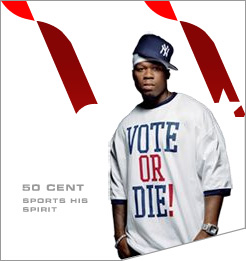 New York rap star 50 Cent poses to help
New York rap star 50 Cent poses to help 